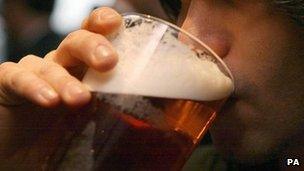Tougher alcohol marketing rules 'may be needed'
- Published

MPs said the alcohol strategy was too focused on binge drinking
Tougher rules on alcohol marketing may be needed, including possibly a ban on sports sponsorship, MPs say.
The House of Commons health committee said the measures could be required as the industry was still not doing enough to tackle problem drinking.
The cross-party group came to the conclusion after reviewing the government's English alcohol strategy.
It said the strategy was too focused on binge drinking instead of looking at wider long-term alcohol misuse issues.
The policy document was unveiled in March and included steps such as giving greater powers to local agencies to restrict opening hours.
But the MPs pointed out that as there were still nearly 7,000 alcohol-related deaths a year, it was essential more was done to prevent and treat health problems.
'Civic duty'
The strongest criticism was reserved for the government's relationship with industry.
Last year, ministers launched a responsibility deal which involved a series of pledges by drink firms as well as supermarkets and food producers about how they would make their products healthier and act more responsibly.
But committee chairman Stephen Dorrell said the industry should not receive credit for this as it was their "civic duty" to act responsibly.
Instead, he criticised them for not being honest about their motivations for investing in advertising.
He said drinks firms were still arguing that advertising did not recruit new drinkers, but was just about creating brand loyalty.
"We don't think the industry has a sufficiently well-developed sense of what it takes to trade responsibly," he added.
The report called on Public Health England, a new body within the Department of Health, to look at the regulation system used in France.
Loi Evin was introduced in 1991 and bans alcohol advertising targeted at young people and being aired in cinemas as well as stopping the sponsorship of cultural or sporting events.
Mr Dorrell said it would not be appropriate to lift the rules wholesale, but said some of them should be considered.
Minimum price
However, the MPs did back the government's proposals to introduce a minimum price for alcohol.
But they warned its effectiveness should be closely monitored if it was brought in.
Eric Appleby, chief executive of Alcohol Concern, said he agreed with the criticisms, adding there should be a review of advertising rules and the wider responsibility deal.
Henry Ashworth, of the Portman Group, which represents the drinks industry on social responsibility issues, said it was "deeply disappointing" that the MPs had failed to understand the significance of the responsibility deal.
In particular, he highlighted the pledge to reduce alcohol units in a range of leading brands and to introduce new ranges of lower alcohol products.
A Department of Health spokeswoman said the measures being introduced would tackle the health problems from excess drinking.
"We are committed to tackling the serious problem of alcohol misuse," she added.
- Published23 March 2012
- Published23 March 2012
- Published2 March 2012
- Published9 January 2012
- Published12 October 2011
- Published18 January 2011